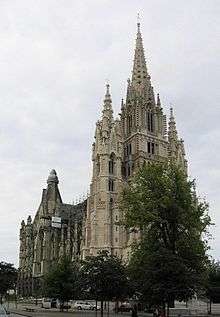Church of Our Lady of Laeken
| Church of Our Lady of Laeken | |
|---|---|
 | |
| 50°52′44″N 4°21′21″E / 50.879°N 4.3557°ECoordinates: 50°52′44″N 4°21′21″E / 50.879°N 4.3557°E | |
| Country | Belgium |
| Denomination | Roman Catholic |
| Website |
www |
| Architecture | |
| Status | Parish church |
| Functional status | Active |
| Architect(s) | Joseph Poelaert |
| Style | Gothic Revival |
| Administration | |
| Archdiocese | Mechelen-Brussels |
The Church of Our Lady of Laeken (French: Église Notre-Dame de Laeken; Dutch: Onze-Lieve-Vrouwekerk van Laken) is a neo-Gothic Roman Catholic church in Laeken, Brussels. It was originally built in memory of Queen Louise-Marie, wife of King Leopold I to the design of architect Joseph Poelaert.
Louise-Marie died in Ostend in 1850 and wished to be buried in Laeken. The nearby Royal Castle of Laeken was, and still is, the royal residence. Leopold I wished the church to be constructed in her memory and as a mausoleum for her.
The young architect Joseph Poelaert was chosen to design the new church.[1] (He later became best known for the Law Courts of Brussels.)
Royal Crypt
The first stone was laid by Leopold I in 1854. The church was consecrated in 1872, but not completed until 1909 after a lengthy interruption of the work. The crypt holds the tombs of the Belgian royal family, including those of all the former Belgian kings. These tombs include:
- Leopold I of Belgium
- Leopold II of Belgium
- Albert I of Belgium
- Elisabeth of Bavaria
- Baudouin of Belgium
- Queen Fabiola of Belgium
- Prince Leopold, Duke of Brabant
- Prince Baudouin of Belgium
- Charlotte of Belgium, later known as Carlota of Mexico, empress consort of Emperor Maximilian I of Mexico
The adjacent Laeken Cemetery behind the church is known as the "Belgian Père Lachaise" because it is the burial place of the major catholic nobility, important families and some famous artists.
Gallery
-

Inside the church
-
Grave of Prince Baudouin with honour guard
References
- ↑ "Notre Dame church of Laken in Brussels". Retrieved 2009-05-01.